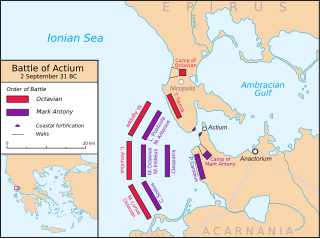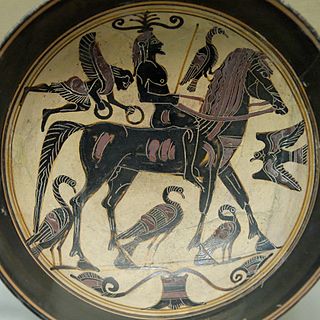This article needs additional citations for verification .(May 2018) (Learn how and when to remove this template message) |
Gymnasiarch (Latin : gymnasiarchus, from Greek : γυμνασίαρχος, gymnasiarchos), which derives from Greek γυμνάσιον (gymnasion, gymnasium) + ἄρχειν, archein, to lead, was the name of an official of ancient Greece whose rank and duties varied widely in different places and at different times.

Greek is an independent branch of the Indo-European family of languages, native to Greece, Cyprus and other parts of the Eastern Mediterranean and the Black Sea. It has the longest documented history of any living Indo-European language, spanning more than 3000 years of written records. Its writing system has been the Greek alphabet for the major part of its history; other systems, such as Linear B and the Cypriot syllabary, were used previously. The alphabet arose from the Phoenician script and was in turn the basis of the Latin, Cyrillic, Armenian, Coptic, Gothic, and many other writing systems.

The gymnasium in Ancient Greece functioned as a training facility for competitors in public game(s). It was also a place for socializing and engaging in intellectual pursuits. The name comes from the Ancient Greek term gymnós meaning "naked". Only adult males were allowed to use the gymnasia.

Ancient Greece was a civilization belonging to a period of Greek history from the Greek Dark Ages of the 12th–9th centuries BC to the end of antiquity. Immediately following this period was the beginning of the Early Middle Ages and the Byzantine era. Roughly three centuries after the Late Bronze Age collapse of Mycenaean Greece, Greek urban poleis began to form in the 8th century BC, ushering in the Archaic period and colonization of the Mediterranean Basin. This was followed by the period of Classical Greece, an era that began with the Greco-Persian Wars, lasting from the 5th to 4th centuries BC. Due to the conquests by Alexander the Great of Macedon, Hellenistic civilization flourished from Central Asia to the western end of the Mediterranean Sea. The Hellenistic period came to an end with the conquests and annexations of the eastern Mediterranean world by the Roman Republic, which established the Roman province of Macedonia in Roman Greece, and later the province of Achaea during the Roman Empire.
Contents
In Classical Athens during the fifth and fourth centuries B.C.E., a gymnasiarch was chosen annually from each tribe to bear the expenses of the torch races (see Lampadephoria). The duties included the payment of all expenses connected with the training of the competitors, and the office was one of the most expensive of the public services demanded by Athens of her wealthy citizens. The name seems to imply that the gymnasiarch had also certain rights and duties in the gymnasia during the training of the youths, but there is no definite information on this subject.

The city of Athens during the classical period of Ancient Greece was the major urban center of the notable polis (city-state) of the same name, located in Attica, Greece, leading the Delian League in the Peloponnesian War against Sparta and the Peloponnesian League. Athenian democracy was established in 508 BC under Cleisthenes following the tyranny of Isagoras. This system remained remarkably stable, and with a few brief interruptions remained in place for 180 years, until 322 BC. The peak of Athenian hegemony was achieved in the 440s to 430s BC, known as the Age of Pericles.
Lampadephoria was an ancient Greek type of relay race using a torch which was passed between the runners. The race was run usually on foot, but sometimes it was also on horses by ephebi. The winner was the first team to pass the torch over the finish line. If a torch went out the team would lose the race.
After the establishment of Macedonian power, there was a change at Athens. One gymnasiarch was chosen annually, and his office was one of great dignity. He had the general oversight of order and discipline in the gymnasium of the epheboi and sometimes financed heavy expenses from his own purse. The same name was given to rich epheboi, who undertook for a longer or shorter period, generally one month, to bear certain heavy charges for their comrades, such as the expenses of festivals, or of furnishing the oil needed in the gymnasium.
Outside of Athens and the states which copied her gymnastic system, the term denoted either magistrates who had charge of the gymnastic and literary instruction, or those who have to provide for certain expenses connected with the gymnasium or festivals, either from their own property or from the public funds. There was a wide diversity in details.











